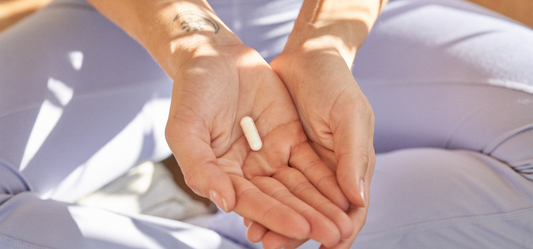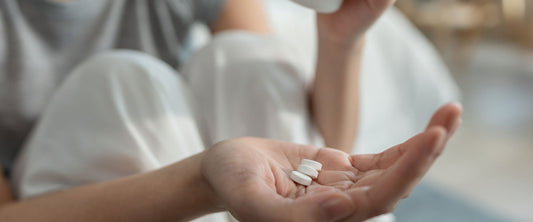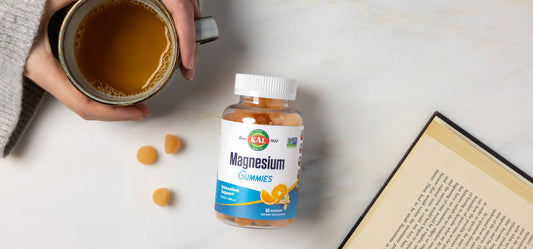How is it that you can smell a rose, taste chocolate, turn a doorknob, brush your teeth, or even smile? All your motor and sensory functions take place because of electrical signals between the 12 pairs of cranial nerves that run from the back of your brain to other parts of the body.1
The vagus nerve has the widest distribution in the body and is the longest cranial nerve running from the medulla in the brain all the way to the abdomen while it performs both motor and sensory functions.2 Because it is a key part of the parasympathetic nervous system, it helps influence the stress response.3 Research also demonstrates that the vagus nerve may positively influence heart health,4 as well as mood and brain function.5 The researchers of a 2022 study showed that vagus nerve stimulation helped support overall improved mood and mood recovery after a stressful event.6
Calm Nervous System
Interestingly, having a calm nervous system requires stimulation of the vagus nerve. While you may feel stimulated enough when you’re feeling stressed, vagus nerve stimulation may help calm the central nervous system and aid in relaxation, which may help you feel less stressed.
Fortunately, there are a few simple ways to stimulate the vagus nerve. During the hectic holiday season, you may want to put these strategies into action.
Nerve Calming Techniques
Slow deep breathing is a great way to stimulate the vagus nerve and ease anxiety.7 Research demonstrates that slowing down the breath not only stimulates the vagus nerve, but it also has many positive psycho-physiology effects on the brain and the body.8
One form of deep breathing made popular by integrative medicine pioneer Andrew Weil, MD, is known as 4-7-8 breathing where you breathe in slowly for a count of four, hold for a count of seven, and breathe out for a count of eight. Research demonstrates that this form of deep breathing may help support healthy heart function.9
In addition to deep breathing, meditation and mindfulness exercises like yoga and Thai Chi have been shown to stimulate the vagus nerve.10
Cold plunging has become all the rage because it can stimulate the vagus nerve, but research is limited. Regarding cold therapy, one randomized controlled trial from 2018 found that cold stimulation to the neck lowered heart rate and stimulated the vagus nerve.11
The Bottom Line
Research continues to indicate that vagus nerve stimulation is a helpful and effective stress management strategy. In addition, it may also help support a healthy heart and mood. The best part of vagus nerve stimulation is that it’s free and easy to do by taking some deep breaths, meditating, doing some yoga, or even taking a cold shower.
If you’re feeling a little over stimulated this holiday season, consider activating your vagus nerve to help find a calming solution. Looking for other effective ways to destress during the holidays? Find the right magnesium for you. And consider a relaxing drink with our Calming Magnesium blueberry powder.
For more tips on nutrition, mind & body health, and taking care of your family follow us on Facebook @kalvits and Instagram at @kalvitamins!
References
- Cleveland Clinic. Cranial nerves. 2021;Oct 27. https://my.clevelandclinic.org/health/body/21998-cranial-nerves
- Tewfik TL. Vagus nerve anatomy. Medscape. 2017;Dec 8. https://emedicine.medscape.com/article/1875813-overview?form=fpf
- Gazella K. Vagus nerve stimulation in clinical practice. Integrative Practitioner. 2023;July 5. https://www.integrativepractitioner.com/whole-systems-medicine/vagus-nerve-stimulation-in-clinical-practice
- Elamin A, Forsat K, Senok S, Goswami N. Vagus nerve stimulation and its cardioprotective abilities: a systematic review. Journal of Clinical Medicine. 2023;12(5). https://www.mdpi.com/2077-0383/12/5/1717
- Noble LJ, Souza RR, McIntyre CK. Vagus nerve stimulation as a tool for enhancing extinction in exposure-based therapies. Psychopharmacology (Berl). 2019;236(1):355-367. https://www.ncbi.nlm.nih.gov/pmc/articles/PMC6368475/?report=reader
- Ferstl M, Teckentrup V, Lin WM, et al. Non-invasive vagus nerve stimulation boosts mood recovery after effort exertion. Psychol Med. 2022;52(14):3029-3039. https://www.ncbi.nlm.nih.gov/pmc/articles/PMC9693679/?report=reader
- Magnon V, Dutheil F, Vallet GT. Benefits from one session of deep and slow breathing on vagal tone and anxiety in young and older adults. Scientific Reports. 2021;11. https://www.nature.com/articles/s41598-021-98736-9
- Zaccaro A, Piarulli A, Laurino M, et al. How Breath-Control Can Change Your Life: A Systematic Review on Psycho-Physiological Correlates of Slow Breathing. Front Hum Neurosci. 2018;12:353. https://www.ncbi.nlm.nih.gov/pmc/articles/PMC6137615/?report=reader
- Vierra J, Boonla O, Prasertsri P. Effects of sleep deprivation and 4-7-8 breathing control on heart rate variability, blood pressure, blood glucose, and endothelial function in healthy young adults. Physiol Rep. 2022;10(13). https://www.ncbi.nlm.nih.gov/pmc/articles/PMC9277512/?report=reader
- Gerritsen RJS, Band GPH. Breath of Life: The Respiratory Vagal Stimulation Model of Contemplative Activity. Front Hum Neurosci. 2018;12:397. https://www.ncbi.nlm.nih.gov/pmc/articles/PMC6189422/?report=reader
- Jungmann M, Vencatachellum S, Van Ryckeghem D, Vögele C. Effects of Cold Stimulation on Cardiac-Vagal Activation in Healthy Participants: Randomized Controlled Trial. JMIR Form Res. 2018;2(2):e10257. https://www.ncbi.nlm.nih.gov/pmc/articles/PMC6334714/?report=reader




